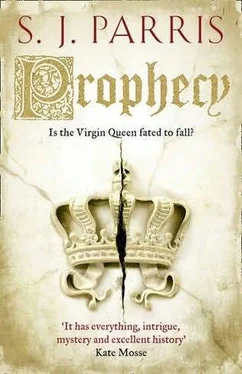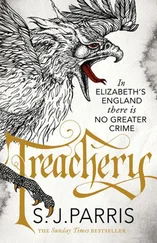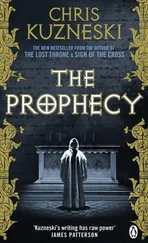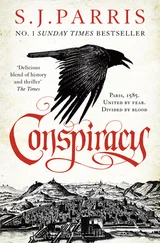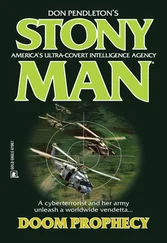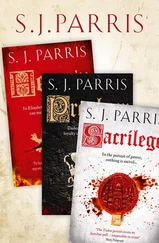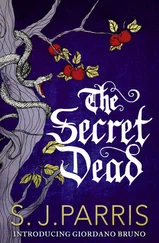‘Put that away,’ Fowler hisses, casting his eyes quickly around the room before squatting by the table. ‘It’s illegal even to possess printed prophecies now — you don’t know who’s watching.’
‘These murders are doing our job for us,’ Douglas remarks, ignoring him and prodding the pamphlet, his voice barely raised above a whisper. ‘Undermine the people’s confidence in her, that’s all it needs. You’ll find there’ll be very little resistance to a change of sovereign once they have proof that the Almighty’s set his face against her.’
‘You underestimate the stubbornness of the English,’ Fowler mutters, shaking his head. ‘And their dislike for Rome. Remember the discontent in the streets when it was thought the queen might marry a Catholic Frenchman, the pamphlets that appeared then?’
‘Oh, aye?’ Douglas straightens, as if squaring up for a fight, then remembers where he is and drops his voice again. ‘And you underestimate the number of simple folk in the kingdom, William. There’s far more of them love Rome than you think. People miss the reassurances of the old faith. They miss their wooden saints and pilgrimages and the comfort of confession, penance and absolution.’ He points a finger in Fowler’s face. ‘They knew where they were with the old faith, and simple people like certainty. You set foot in any of the wee towns and villages around the country — no one’s read bloody Erasmus or Tyndale. They go to church where they’re told because they can’t afford the fines, but in their hearts they’ve never stopped believing the miracle of the Mass. Even the churchmen. And if they hear news that the Devil is cutting a swathe through the court because their sovereign flirts with sorcery, they’ll be glad of the chance for a new one, believe me. There’s enough simple folk to fuel an uprising when the day comes, if they’re encouraged in the right way.’
He sounds as enthused about this prospect as if he had planned it himself, and he is right that these murders at court, if the news spreads in the right way, can only be useful to the conspirators if there is to be an invasion of Catholic forces. But once again I am brought back to the same question: If the murders are part of the Catholic plot, why dress them up so obviously to look like a Catholic plot? What is to be gained by such an elaborate double bluff?
‘I wonder if this murderer knows he is helping our cause,’ I say tentatively, still looking down at the pamphlet. The news must have travelled with wings for a pamphlet to have been written and printed less than a day after the murder. But again, there were enough servants at Whitehall who witnessed the events of the previous night to make this possible, and plenty of people who were sufficiently opposed to Elizabeth to risk their lives by printing such material.
‘Of course not.’ Douglas glances around. ‘This is just some lunatic who hates women. But I’m saying we can turn it to our advantage.’
‘A lunatic inside the court, it seems,’ Fowler adds, folding his hands together. ‘Everyone was gathered there last night for the concert.’
Douglas shrugs.
‘No better time to break in, then, when all eyes are turned elsewhere,’ he sniffs. ‘Anyway — that’s not my concern. It’s in our interest to ensure this kind of thing —‘ he waves the pamphlet — ‘finds as wide an audience as possible. Spread the fear. Undo her popularity among her subjects first.’ He levers himself out of his seat, pulls his cloak around his shoulders and, almost as an afterthought, empties his second tankard of beer, slamming it down on the table. ‘Which reminds me — I have matters to attend to. A pleasure, gentlemen. Until some other evening, no doubt.’ He replaces his shapeless wool cap, touches the peak of it with a mock bow, and is absorbed into the crowd.
‘I take it you’re paying for his, then?’ says the serving girl, appearing at my elbow with her hand out impatiently for coins. Only then do I realise that Douglas, having invited me for a drink, has left without paying, an outcome I probably should have foreseen.
Fowler smiles ruefully as I count out money for the beer.
‘You are not yet familiar with the ways of our friend Douglas, I see.’
The girl turns the coins over in her palm and looks at me suspiciously, clearly wondering if I might have tried to deceive her with some dubious foreign currency. Satisfied, she gestures towards the tankards. I look at Fowler, who holds up a hand to decline.
‘Thank you, no. This place is giving me an aching head. The sky is clearing a little, I think. We could walk.’
‘I’m not sure Douglas counts himself much of a friend of yours,’ I say, as we squeeze through to the door. Fowler is right; the sky is still streaked with threatening grey and the wind chivvies leaves along the gutters, but the rain has abated for the moment. The cobbles are slippery with horseshit and sodden straw, and I step carefully to avoid the foul brown stream running down the gutters at the edge of the street.
‘No, I don’t suppose he does.’ He pulls up his collar and we fall into step in the direction of Paul’s Churchyard; among the crowds, there is hardly a better place to pass unobserved, though I keep one hand tightly around my purse. ‘I know too much about Douglas, that’s the problem. When a man flees to another country to reinvent himself, the last thing he wants is to find someone from home, who could spill the whole of his history at any moment. Imagine if someone who remembered you from Italy showed up at Salisbury Court.’ He smiles, but I recall Marie de Castelnau’s sly allusion to the dead man in Rome, and wrap my arms tight around my chest to suppress a shiver.
‘In any case, we had best be on our guard,’ I say, as we slip through the gates into the shadow of the great cathedral, whose walls rise two hundred feet above us, its broken spire poking like the stump of a finger into the sodden sky. ‘They suspect someone of tampering with the correspondence.’ As we saunter by the booksellers’ stalls, their trestles pulled in out of the earlier rain, I tell him of what passed in Phelippes’s workshop, the missing ring and the conspirators’ growing concern over their communications with Mary. I am struck, in the retelling, by the realisation that Henry Howard did not confide in Douglas about what he believed had been stolen; clearly there are secrets within secrets fermenting behind the closed doors of Salisbury Court. Phelippes’s offhand joke about betrothal floats back into my mind with sudden significance, so that I stop dead for a moment. If Howard is conducting his own private correspondence with Mary Stuart, could it be that he aspires to finish what his brother started? It would be a momentous gamble; if these invasion plans stand even a chance of succeeding, then any man who marries Mary could expect to become king of England when she is crowned. Could he be courting her with his private coded letters? Such an aspiration would not be beyond Henry Howard.
‘Bruno?’ Fowler has stopped too and is looking at me with concern. I decide to keep this line of speculation to myself.
‘So Howard thinks it is me, it seems, and Douglas wants to believe it is you,’ I say, as we round the apse at the east end of the building and find ourselves at the back of a crowd gathered at the small outdoor pulpit that marks Paul’s Cross. Buffeted by the wind, the people huddle stoically, craning forward to catch the words of the preacher before they are snatched away into the air. I can barely see the man in his domed pepperpot stand over the hats of the crowd, but from the fragments of his sermon that reach us, it seems he is preaching against divination, fortune-telling and, yes, ancient prophecies. He is shouting something about King Saul and the Witch of Endor, his words whipped away by the wind. I presume the sermon has been officially commissioned; aptly, since the churchyard is the prime market for illegal pamphleteers, peddling handbills like the one Douglas just showed us, slipping through the crowd among the men who sell you prohibited holy relics from inside their coats.
Читать дальше
Конец ознакомительного отрывка
Купить книгу
